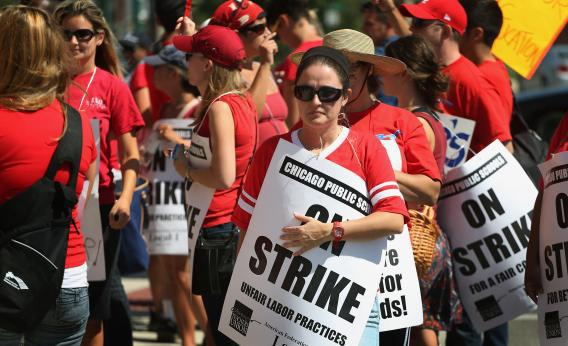The Chicago Teachers Union strike is not primarily about salary issues, but money is relevant to any labor dispute since management could always use money to sweeten the pot and gain concessions on other topics. So how are Chicago teachers doing money-wise? The answer is pretty good. Dean Baker, who’s normally (and rightly) an advocate of exposing skilled professionals to greater competition to raise real working-class living standards, seems to make an exception for Chicago Public School teachers and thinks the only relevant comparison is to super-rich finance guys:
And it’s true, teachers are modestly compensated relative to financiers. But by this same logic Baker shouldn’t be worried that Americans pay too much to doctors who, like teachers, are paid less than Wall Street bigshots.
It’s probably more fruitful to compare Chicago Public Schools teachers to other teachers. According to the Bureau of Labor Statistics, in the Chicago Metropolitan Division (i.e., Chicago and its near suburbs) high-school teachers earn a mean of $69,470 and elementary school teachers earn a mean of $61,970. The CPS systemwide mean of $74,236 is higher than either of those, and of course Chicago Public School teachers are a large component of the metro Chicago average. So Chicago is offering more compensation than the average Chicago suburb. Chicagoland as a whole pays teachers an above-average amount. The national average high-school teacher makes $56,760 and the average elementary school teacher makes $55,270.
In the city of Chicago, the median household income is $46,877—a number that’s not directly comparable to mean salary statistic both because a median isn’t a mean and because a household can have multiple workers. The Illinois median household income is $55,735, and the national median is $55,735.
It might also be useful to compare CPS teachers’ earnings to the national average for college graduates, since that’s the relevant labor market niche for a teacher:
What I think this drives home is that not only is Chicago compensating its teachers unusually generously, but Chicago is right to do so. The national average teacher is paid a low amount for a college graduate, which is not a smart way to try to attract and retain the best possible teachers. Chicago, by being unusually generous, is offering a level of compensation that seems modestly above average for a college graduate. That’s exactly what I would want to see from my city—a real effort to invest the money necessary to hire and retain quality people.
Which returns us to what’s probably the most contentious issue in the strike. The city wants to make test-based, “value-added” models of teacher performance a very important part of retention and compensation policies. The union, reflecting the views of most classroom teachers, hates that idea. And here’s the crux of the matter. Chicago’s teachers aren’t living lives of luxury, but the city really is investing in paying them an above-average amount. Now it wants to ensure that it’s not just investing a lot of money but investing that money in quality. Chicago teachers don’t want to be subjected to that kind of regime and reject the premise that the test-based model the city’s elected officials favor is a good proxy for quality.
